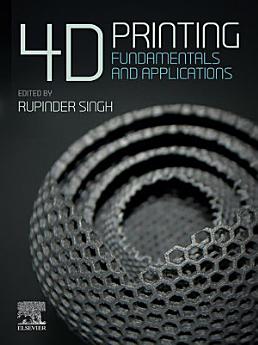4D Printing: Fundamentals and Applications
Rupinder Singh
জানু ২০২২ · Elsevier
ইবুক
194
পৃষ্ঠা
family_home
যোগ্য
info
reportমূল্যাংকন আৰু পৰ্যালোচনা সত্যাপন কৰা হোৱা নাই অধিক জানক
এই ইবুকখনৰ বিষয়ে
4D Printing: Fundamentals and Applications explores both autonomic and non-autonomic systems with different stimulus such as temperature, current, moisture, light and sound. In addition, the fifth dimensional aspect using more than one stimulus is outlined for additive manufacturing processes. The book presents both an introduction to the basic understanding of hybrid processes and explores the physics behind the process (in the form of derivation and numerical problems). For the field engineer, applicable codes and standards for each hybrid process are provided. Lastly, case studies are included in each section to provide the reader with a model to explore future research directions. - Begins with the fundamentals of the hybrid additive manufacturing process - Presents a discussion of the physics behind smart material functioning in hybrid additive manufacturing - Includes real world case studies on 4D and 5D printing, as well as a look at future research dimensions
লিখকৰ বিষয়ে
Dr. Rupinder Singh is currently Professor and Head of the Department of Mechanical Engineering, National Institute of Technical Teacher Training and Research, Chandigarh. He received a Ph.D. in Mechanical Engineering from the Thapar Institute of Engineering and Technology Patiala. His research interests are additive manufacturing, composite filament processing, rapid tooling, metal casting and plastic solid waste management
এই ইবুকখনক মূল্যাংকন কৰক
আমাক আপোনাৰ মতামত জনাওক।
পঢ়াৰ নির্দেশাৱলী
স্মাৰ্টফ’ন আৰু টেবলেট
Android আৰু iPad/iPhoneৰ বাবে Google Play Books এপটো ইনষ্টল কৰক। ই স্বয়ংক্রিয়ভাৱে আপোনাৰ একাউণ্টৰ সৈতে ছিংক হয় আৰু আপুনি য'তে নাথাকক ত'তেই কোনো অডিঅ'বুক অনলাইন বা অফলাইনত শুনিবলৈ সুবিধা দিয়ে।
লেপটপ আৰু কম্পিউটাৰ
আপুনি কম্পিউটাৰৰ ৱেব ব্রাউজাৰ ব্যৱহাৰ কৰি Google Playত কিনা অডিঅ'বুকসমূহ শুনিব পাৰে।
ই-ৰীডাৰ আৰু অন্য ডিভাইচ
Kobo eReadersৰ দৰে ই-চিয়াঁহীৰ ডিভাইচসমূহত পঢ়িবলৈ, আপুনি এটা ফাইল ডাউনল’ড কৰি সেইটো আপোনাৰ ডিভাইচলৈ স্থানান্তৰণ কৰিব লাগিব। সমৰ্থিত ই-ৰিডাৰলৈ ফাইলটো কেনেকৈ স্থানান্তৰ কৰিব জানিবলৈ সহায় কেন্দ্ৰত থকা সবিশেষ নিৰ্দেশাৱলী চাওক।






